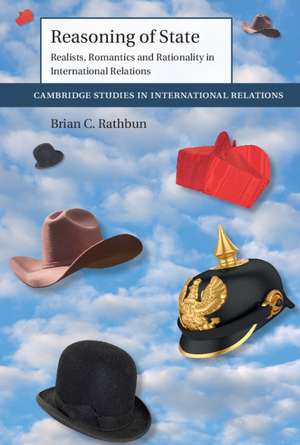Reasoning of State: Realists, Romantics and Rationality in International Relations: Cambridge Studies in International Relations, cartea 149
Autor Brian C. Rathbunen Limba Engleză Paperback – 13 feb 2019
| Toate formatele și edițiile | Preț | Express |
|---|---|---|
| Paperback (1) | 265.70 lei 3-5 săpt. | |
| Cambridge University Press – 13 feb 2019 | 265.70 lei 3-5 săpt. | |
| Hardback (1) | 646.57 lei 6-8 săpt. | |
| Cambridge University Press – 13 feb 2019 | 646.57 lei 6-8 săpt. |
Din seria Cambridge Studies in International Relations
-
 Preț: 198.90 lei
Preț: 198.90 lei -
 Preț: 232.37 lei
Preț: 232.37 lei -
 Preț: 237.58 lei
Preț: 237.58 lei -
 Preț: 210.70 lei
Preț: 210.70 lei -
 Preț: 190.01 lei
Preț: 190.01 lei -
 Preț: 200.87 lei
Preț: 200.87 lei - 8%
 Preț: 401.24 lei
Preț: 401.24 lei -
 Preț: 229.56 lei
Preț: 229.56 lei -
 Preț: 200.09 lei
Preț: 200.09 lei -
 Preț: 207.82 lei
Preț: 207.82 lei -
 Preț: 158.77 lei
Preț: 158.77 lei -
 Preț: 162.49 lei
Preț: 162.49 lei -
 Preț: 231.47 lei
Preț: 231.47 lei - 11%
 Preț: 584.77 lei
Preț: 584.77 lei -
 Preț: 241.77 lei
Preț: 241.77 lei -
 Preț: 287.87 lei
Preț: 287.87 lei -
 Preț: 209.13 lei
Preț: 209.13 lei -
 Preț: 299.23 lei
Preț: 299.23 lei -
 Preț: 286.13 lei
Preț: 286.13 lei -
 Preț: 287.87 lei
Preț: 287.87 lei - 11%
 Preț: 641.67 lei
Preț: 641.67 lei - 11%
 Preț: 585.78 lei
Preț: 585.78 lei - 14%
 Preț: 843.23 lei
Preț: 843.23 lei -
 Preț: 303.80 lei
Preț: 303.80 lei -
 Preț: 200.79 lei
Preț: 200.79 lei -
 Preț: 284.78 lei
Preț: 284.78 lei -
 Preț: 279.76 lei
Preț: 279.76 lei -
 Preț: 285.75 lei
Preț: 285.75 lei -
 Preț: 324.24 lei
Preț: 324.24 lei -
 Preț: 290.16 lei
Preț: 290.16 lei -
 Preț: 291.69 lei
Preț: 291.69 lei -
 Preț: 392.52 lei
Preț: 392.52 lei -
 Preț: 315.99 lei
Preț: 315.99 lei
Preț: 265.70 lei
Nou
Puncte Express: 399
Preț estimativ în valută:
50.84€ • 54.37$ • 42.39£
50.84€ • 54.37$ • 42.39£
Carte disponibilă
Livrare economică 28 martie-11 aprilie
Preluare comenzi: 021 569.72.76
Specificații
ISBN-13: 9781108446181
ISBN-10: 1108446183
Pagini: 350
Ilustrații: 7 b/w illus. 7 tables
Dimensiuni: 152 x 228 x 18 mm
Greutate: 0.5 kg
Editura: Cambridge University Press
Colecția Cambridge University Press
Seria Cambridge Studies in International Relations
Locul publicării:Cambridge, United Kingdom
ISBN-10: 1108446183
Pagini: 350
Ilustrații: 7 b/w illus. 7 tables
Dimensiuni: 152 x 228 x 18 mm
Greutate: 0.5 kg
Editura: Cambridge University Press
Colecția Cambridge University Press
Seria Cambridge Studies in International Relations
Locul publicării:Cambridge, United Kingdom
Cuprins
Introduction: three theoretical arguments, four 'great men' of history, multiple methods, and disciplines; 1. The psychology of rationality: cognitive style in international relations; 2. The three 'r's of international relations: realism, romanticism and rationality; 3. Little Bismarcks: a laboratory experiment on variation in rational thinking and rational behavior; 4. The 'prince' among men: Bismarck's realpolitik in Prussian politics; 5. Cold blood and iron: Bismarck, the struggle with Austria and German unification; 6. Blind faith: Richelieu, the devoted, and France in counter-reformation Europe; 7. 'Blood, toil, tears and sweat': Churchill, romanticism and the rational appeasement debate; 8. 'In defeat, defiance': Churchill in words (1935–39) and in deeds (1940) with Therese Anders; 9. 'Beginning the world all over again': resolving the paradox of Ronald Reagan; 10. Winning one as the Gipper? Reagan's administration and American engagement with the Soviet Union; Conclusion: the irrationality of rational choice: saving a paradigm from itself; References; Index.
Recenzii
'Rathbun's argument that many decision-makers are not Realists, but rather are Romantics is original, important, and well supported by analysis and evidence. The result is an important challenge to what is generally believed and even those who are not convinced will need to grapple with it.' Robert Jervis, author of How Statesmen Think
'Brian C. Rathbun has written a superb book about rationality and romantics in international politics. He asks the important question - when are leaders rational - and looks at the differences across leaders. Leaders are rational and intuitive at different times, but some are typically more of one than the other most of the time. This book changes our understanding of the dynamics of decision making.' Janice Gross Stein, Munk School of Global Affairs, University of Toronto
'Reasoning of State is an impressive and provocative book. It is highly original, engaging, and beautifully written. I have rarely had so much fun reading an academic study. I strongly recommend it to IR scholars in general and rational choice theorists in particular.' Robin Markwica, H-Diplo
'Brian C. Rathbun has written a superb book about rationality and romantics in international politics. He asks the important question - when are leaders rational - and looks at the differences across leaders. Leaders are rational and intuitive at different times, but some are typically more of one than the other most of the time. This book changes our understanding of the dynamics of decision making.' Janice Gross Stein, Munk School of Global Affairs, University of Toronto
'Reasoning of State is an impressive and provocative book. It is highly original, engaging, and beautifully written. I have rarely had so much fun reading an academic study. I strongly recommend it to IR scholars in general and rational choice theorists in particular.' Robin Markwica, H-Diplo
Notă biografică
Descriere
Challenges the assumption of the rationality of foreign policy makers in international relations, showing how leaders systematically vary in the rationality of their thinking.
